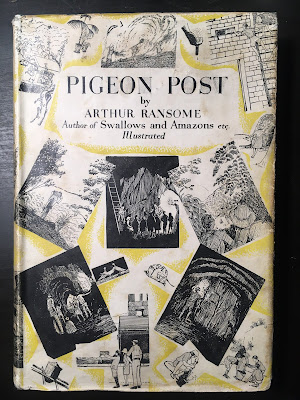A Book by its Cover - July 2020

I’m not sure whether ‘You can’t judge a book by its cover’ is a proverb or a metaphor or a piece of advice. If it’s a piece of advice, I’ve always ignored it. And if it’s true than I wonder why publishers spend so much time trying to get the cover right and why it caused such a kerfuffle when Waterstone’s recently turned all the books round to show the blurb on the back. My kind of cover. This was published in 1944, not long after Visitors from London. Last month I wrote about the book which won the Carnegie in 1940, and Penny Dolan wondered ‘how the book worked with the readership rather than the library judging panel’. That’s a question that’s hard to answer after all this time, but it made me think about how I chose books when I was a child, and about the books I read and enjoyed myself. It's a book with children in it. I expect they're visiting from London. I would not have taken this off the library shelf, which is a shame because I might have ...



